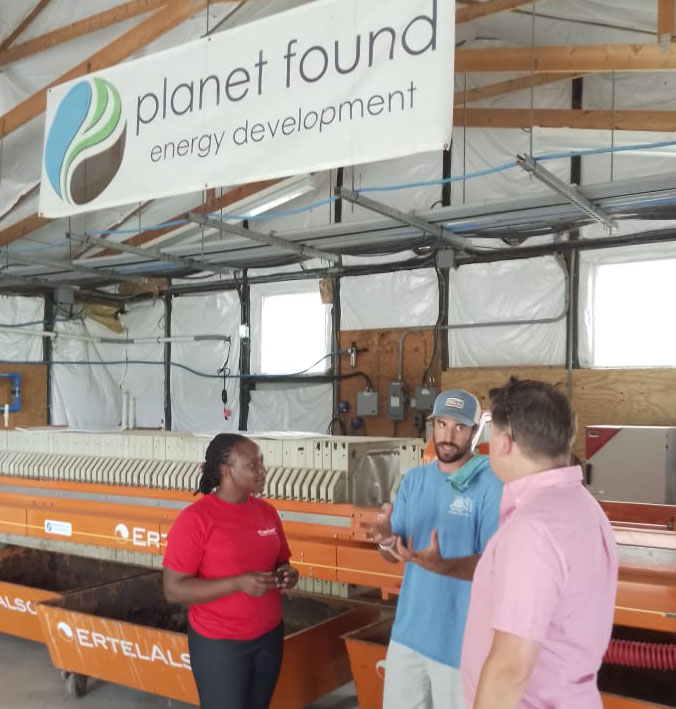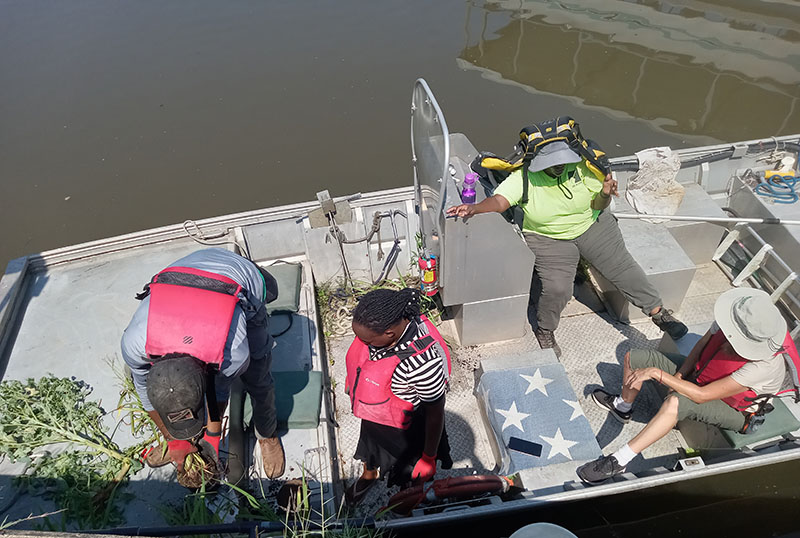An expanded network helps Ugandan Fellow Grace Nalugwa connect ideas to new technology
Grace Nalugwa meets with Justan Randolph (BS '18) from Green Mechanics, LLC. at the Bladensburg Waterfront Park to view the green bulkheads project.
It’s often said that one of the best take-aways from the university experience is the network of colleagues, mentors and experts that will help you succeed throughout your career. That may be especially true for young entrepreneurs—even those who come to campus for just a short visit.
Take Ugandan entrepreneur Grace Nalugwa, for example. Her one-month fellowship with Associate Professor David Tilley introduced her to a network of experts and leaders that launched her career in an unexpected new direction, as a visionary for renewable energy and sustainable practices.

Nalugwa was a fellow in the U.S. State Department’s Mandela Washington Fellowship for Young African Leaders program, which brought her to the U.S. to build her entrepreneurial and leadership skills. Nalugwa came to UMD with intentions of expanding her understanding of biogas technology, which involves turning organic waste such as kitchen scraps and corn stalks into cooking fuel.
Nalugwa had run a successful pilot program in 2021 to build a bio-digester that turned this type of waste into cooking gas, and she was eager to see how this technology was being used in the U.S. But during her visit, Nalugwa discovered a much broader set of nature-based technologies that she can employ back home. Now, she intends to go even further, using biogas to generate electricity, developing waste water reuse systems and improving farm soil quality all at the same time.
“I met so many people here that have given me so many ideas,” Nalugwa said. “I have learned that these three concepts of food, energy and water have to move together. While you produce food to feed people, the food waste provides gas for energy, and then the waste from your energy provides fertilizer in the form of ash. It is all connected."
Nalugwa’s early focus on biogas as a cooking fuel was aimed at replacing costly charcoal for cooking and reducing the pressure on deforestation. But Tilley, who is an environmental entrepreneurship expert in the Department of Environmental Science and Technology, introduced Nalugwa to nearly two-dozen researchers and business leaders who expanded her horizons, like UMD professor Stephanie Lansing, who leads the bioenergy and bioprocessing technology lab at UMD. Lansing’s work integrates renewable energy, water quality, waste treatment, and human health.
Nalugwa also met with innovation specialist Sammy Popat from the Vice President for Research’s office who helps entrepreneurs connect with valuable resources, and AGNR alum Cedric Nwafor who founded the non-profit Roots Africa which connects U.S. farming experts to communities in Africa.
“Networking with people who are like-minded is such a key piece of being a successful entrepreneur,” Tilley said. “We have this whole ecosystem of entrepreneurship here, and this fellowship just seemed like a great opportunity to expose Grace to all these things we are exposed to here on campus—the great people and resources—because she needs all of those at her disposal.”
Tilley’s own research focuses on innovation and commercialization of technologies that can help mitigate the effects of climate change. Helping Nalugwa connect her business goals with new technologies was a perfect fit for him.
“I'm really trying to build up more in environmental entrepreneurship specifically, because I feel there's a role for that to play in solving a lot of our environmental and climate problems. I've always thought that these natural-systems-based solutions had applications in the developing world, because they're relatively low tech. They don't require a huge investment of technology and they operate very efficiently.”

The next step for Nalugwa in the Mandela Washington Fellowship program will be for one of her new contacts to meet her in Uganda to help set up her biogas-to-electricity system.
When they arrive, they won’t be starting from the ground up, however. Nalugwa is already an experienced self-starter who began her journey into entrepreneurship in 2011 when she founded a primary school. That leadership earned her a fellowship to South Korea where she first saw organic briquettes used as cooking fuel. Eager to reduce her own cooking expenses, Nalugwa searched youtube for recipes and began making briquettes from kitchen scraps.
Interest among her neighbors and local businesses grew, and Nalugwa realized she had the seeds of a successful business. But after a few years of growing that venture, Nalugwa was troubled by the inefficiency of the technology.
“Out of the waste that we were collecting, only 40% was being converted to briquettes,” Nalugwa said. “Sixty percent is not utilized at all yet, and we have a waste management challenge in our country, where the landfills are now full.”
Always looking for new solutions, Nalugwa discovered biogas, and launched the pilot bio-digester program that brought her to UMD. Through her new connections and Tilley’s mentorship, Nalugwa has expanded her vision yet again, developing a new, holistic framework for her ventures that will connect energy, water use, sustainable farming, and waste recycling in ways that make good business sense and benefit the environment.
“I'm so excited that, as I go back home, I'm going back as an entrepreneur as I came, an ecological engineer by practice, but also as a trainer,” Nalugwa said, “Because I've learned quite a lot of knowledge that I can't hold for myself. I have to give it out. For that case, I am turning my [production] plant into partly a training center for people to come for hands on skills in food, energy and water bio circular economy.”